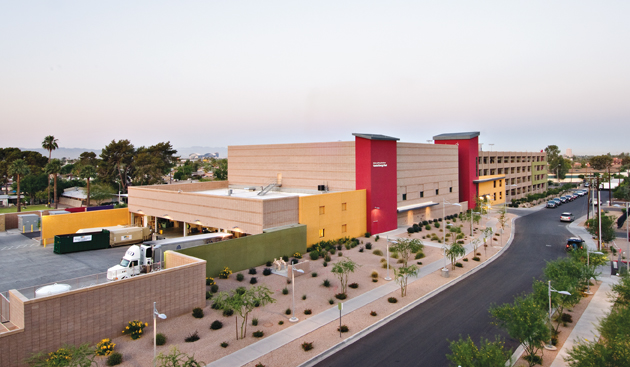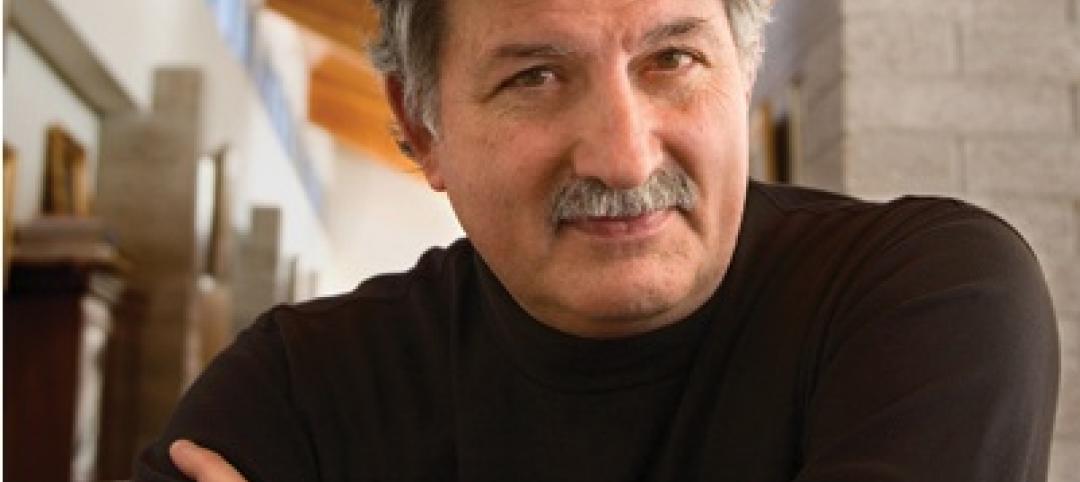Healthcare construction has slowed a bit in the last few years, but it remains a critically important sector for many AEC firms. While healthcare clients are demanding sustainable design and construction as a matter of course, green building is no longer limited strictly to hospital projects.
In Seattle, Swedish Cancer Institute has installed a factory-fabricated radiotherapy treatment “vault” to house its TomoTherapy treatment system. RAD Technology Medical Systems manufactured steel modules for the vault at its production facility, along with prefab wood modules for the patient exam and office portion of the nearly 4,000-sf facility. It is believed to be the first radiation center to earn LEED Silver certification.
Another first—at least for a privately owned facility—goes to San Francisco Surgical Arts’ LEED-CI Platinum (v.2009) oral and maxillofacial surgery office. Environmental Building Strategies led the Building Team—medical designer Kohan Inc. and contractor All Phase Builders—in reducing lighting power 37% and water usage 40% over conventional facilities. Solar-powered keyboards and Energy Star-qualified LED monitors and appliances were also used.
For the $538 million expansion of Phoenix Children’s Hospital (designed by HKS to Green Guide for Health Care standards), Kitchell Contractors built a central energy plant for the 34-acre campus that employs a high-efficiency, 800-ton water-to-water heat pump chiller, a technology widely used in the Middle East.
The central plant will save 5.6 million gallons of water per year, reduce natural gas consumption by 70%, and trim energy and operating costs $11 million over 15 years. The project also received a $464,000 cash award from APS Solutions for Business, the local electrical utility’s energy-conservation program for commercial customers.
In Richmond, Va., Moseley Architects worked with design partners KEI Architects,
Dennis Kowal Architects, and John Dickinson & Partners and GC Kenbridge Construction on the renovation of the Virginia Rehabilitation Center for the Blind and Vision Impaired Administration and Activities Building. The center provides training for blind, vision-impaired, and deaf-blind Virginians to adapt to living with partial or no sight.
Commonwealth guidelines called for the $4,272,600 project to bring the facility, which was built in 1970, up to LEED Silver standards. The team went well beyond that. A central skylit atrium brought light and warmth into the facility. Variable-speed HVAC systems and energy-recovery technology were installed. Single-pane windows were replaced with low-e, double-pane units. Existing halide site lights were upgraded to LED fixtures. Energy use was trimmed 15%, water consumption by 30%, saving 34,000 gallons a year.
As a result of these measures, the project earned LEED Gold certification.
The team also embraced “sustainability” in a larger context in making the center compliant with ADA Accessibility Guidelines. By not focusing exclusively on what could be seen, the team created a design that considered such factors as echoes, smells, and proportions to arrive at what they called a “building for sighted people.”
Another project seeking to break new ground in sustainability is the Palliative Care Campus, a 120-unit Enhanced Assisted Living Residence for persons with serious progressive illnesses. It is said to be the world’s first spirit-centered, enhanced assisted-living community residence. The client, the HealthCare Chaplaincy, is a national leader in research, education, and multi-faith patient-centered care. FXFOWLE Architects is the AOR and designer, in collaboration with MHG Architects and Clodagh Design.
The 16-story, 180,000-sf project, to be built in Lower Manhattan along the East River, will also house a geriatric and palliative care outpatient medical practice, plus research, educational, clinical practice, and administrative spaces. The facility will address not only patients’ physical ills, but also their psychological and spiritual well-being. The HealthCare Chaplaincy hopes the new campus will serve as a national demonstration project for the healthcare industry. +
Related Stories
| May 16, 2011
Dassault Systèmes to distribute Gehry Technologies’ digital project
Dassault Systèmes and Gehry Technologies announced that Gehry Technologies’ Digital Project products will be integrated into the Dassault Systèmes’ portfolio and distributed through Dassault Systèmes. Digital Project is a suite of 3D BIM applications created by Gehry Technologies using Dassault Systèmes’ CATIA as a core modeling engine.
| May 11, 2011
DOE releases guide for 50% more energy-efficient office buildings
The U.S. Department of Energy today announced the release of the first in a new series of Advanced Energy Design Guides to aid in the design of highly energy efficient office buildings. The 50% AEDG series will provide a practical approach to commercial buildings designed to achieve 50% energy savings compared to the commercial building energy code used in many areas of the country.
| May 10, 2011
Google hires Ingenhoven Architects to design new Mountain View office
The current Googleplex is straining at the seams and yet the company is preparing its biggest hiring surge ever, so Google decided now’s the time to build its own office space—a first for the Internet giant. The company hired Ingenhoven Architects, a German firm that specializes in sustainable architecture, to create plans for what could be a 600,000-sf office.
| May 10, 2011
Solar installations on multifamily rooftops aid social change
The Los Angeles Business Council's study on the feasibility of installing solar panels on the city’s multifamily buildings shows there's tremendous rooftop capacity, and that a significant portion of that rooftop capacity comes from buildings in economically depressed neighborhoods. Solar installations could therefore be used to create jobs, lower utility costs, and improve conditions for residents in these neighborhood.
| May 10, 2011
Dinner is now served…atop the Lincoln Memorial?
Take a look at the temporary restaurant sitting atop Brussels’ historic Arc de Triomphe-Triomfboog. The Cube, by Electrolux, offers 18 diners a spectacular view of the Parc du Cinquantenair, and is one of two structures traveling across Europe, making stops at famous landmarks in Belgium, Italy, Switzerland, Sweden, and Russia. What do you think about one of these 60-tonne structures being placed on a U.S. memorial?
| May 6, 2011
Ellerbe Becket now operating as AECOM
*/ The architecture, interiors and engineering firm Ellerbe Becket, which joined AECOM in 2009, has fully transitioned to operating as AECOM as of May 2, 2011.
| May 2, 2011
URS acquires Apptis Holdings, a federal IT service provider
SAN FRANCISCO, CA and CHANTILLY, VA– April 28, 2011 – URS Corporation and Apptis Holdings, Inc., a leading provider of information technology and communications services to the federal government, announced that they have signed a definitive agreement under which URS will acquire Apptis.
| May 2, 2011
Perkins+Will merges with Vermeulen Hind Architects, offically launches Perkins+Will Canada
Ottawa and Hamilton-based Vermeulen Hind Architects, one of Canada’s leading healthcare architectural firms, has merged with Perkins+Will. Vermeulen Hind joins Toronto-based Shore Tilbe Perkins+Will and Vancouver-based Busby Perkins+Will to create Perkins+Will Canada. The combination marks the official launch of Perkins+Will Canada, a merge that will establish the firm as among the pre-eminent interdisciplinary design practices in Canada.
| Apr 26, 2011
Ed Mazria on how NYC can achieve carbon neutrality in buildings by 2030
The New York Chapter of the American Institute of Architects invited Mr. Mazria to present a keynote lecture to launch its 2030 training program. In advance of that lecture, Jacob Slevin, co-founder of DesignerPages.com and a contributor to The Huffington Post, interviewed Mazria about creating a sustainable vision for the future and how New York City's architects and designers can rise to the occasion.










